Sustainable Tourism Development Sample Assignment (Doc)
VerifiedAdded on 2020/12/31
|19
|4227
|423
AI Summary
Contribute Materials
Your contribution can guide someone’s learning journey. Share your
documents today.
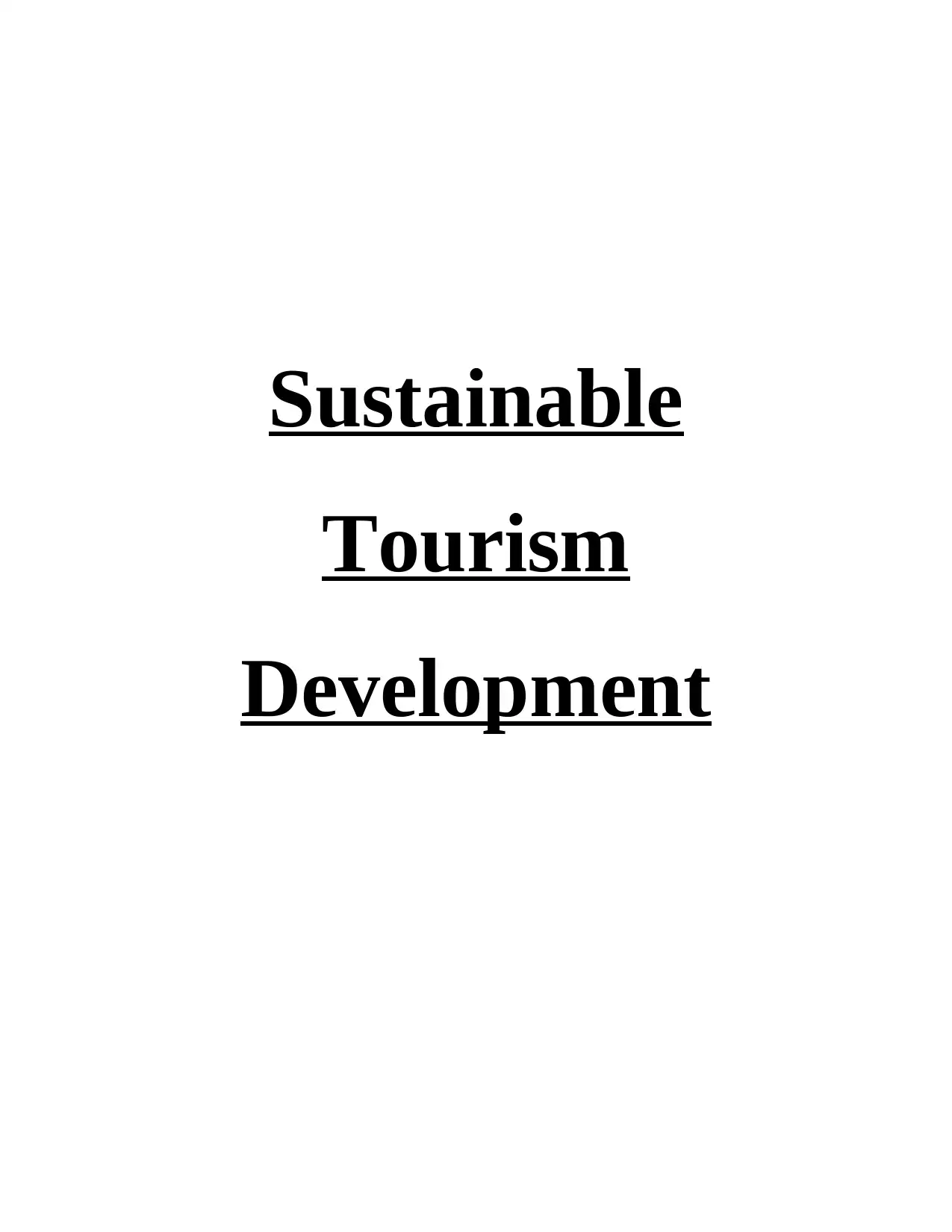
Sustainable
Tourism
Development
Tourism
Development
Secure Best Marks with AI Grader
Need help grading? Try our AI Grader for instant feedback on your assignments.
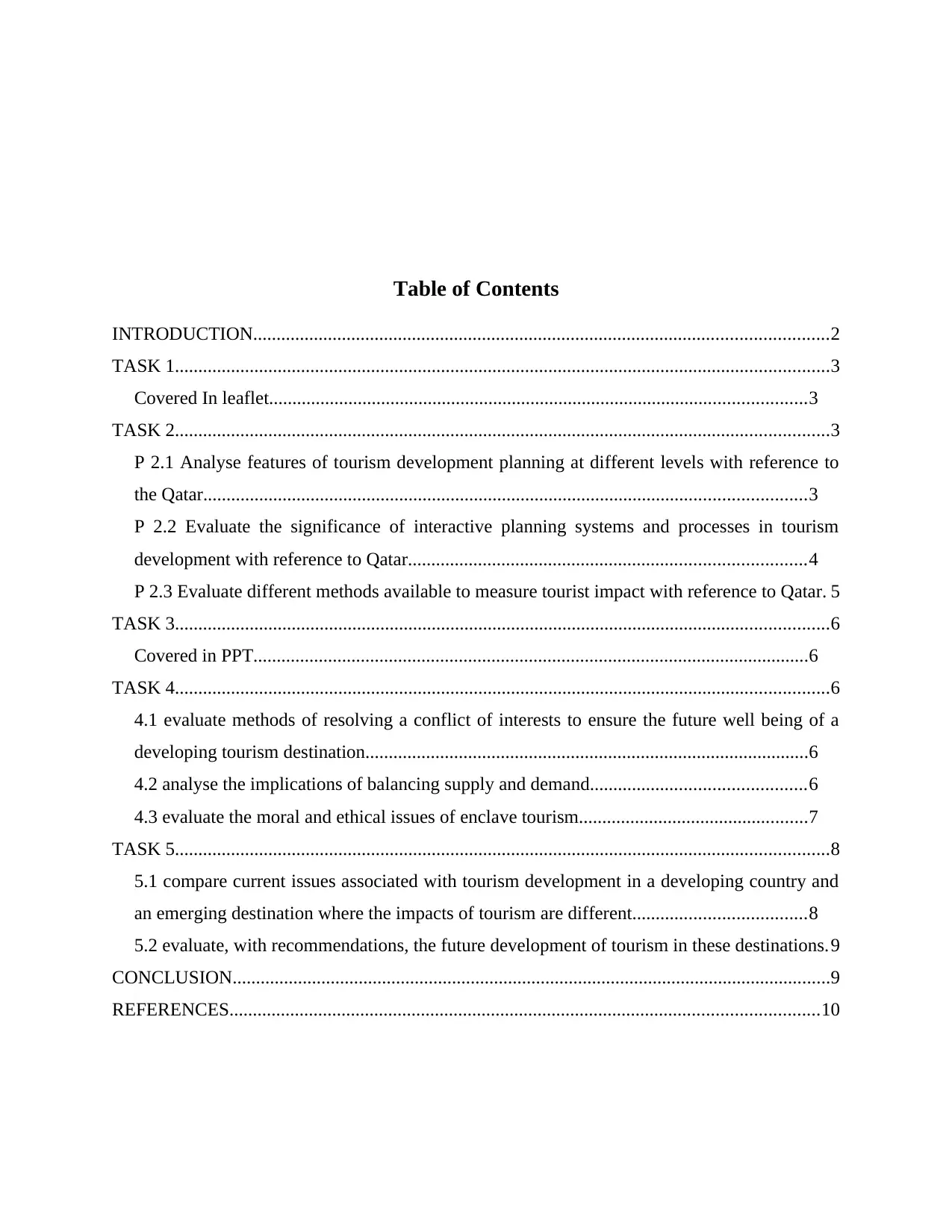
Table of Contents
INTRODUCTION...........................................................................................................................2
TASK 1............................................................................................................................................3
Covered In leaflet...................................................................................................................3
TASK 2............................................................................................................................................3
P 2.1 Analyse features of tourism development planning at different levels with reference to
the Qatar.................................................................................................................................3
P 2.2 Evaluate the significance of interactive planning systems and processes in tourism
development with reference to Qatar.....................................................................................4
P 2.3 Evaluate different methods available to measure tourist impact with reference to Qatar. 5
TASK 3............................................................................................................................................6
Covered in PPT.......................................................................................................................6
TASK 4............................................................................................................................................6
4.1 evaluate methods of resolving a conflict of interests to ensure the future well being of a
developing tourism destination...............................................................................................6
4.2 analyse the implications of balancing supply and demand..............................................6
4.3 evaluate the moral and ethical issues of enclave tourism.................................................7
TASK 5............................................................................................................................................8
5.1 compare current issues associated with tourism development in a developing country and
an emerging destination where the impacts of tourism are different.....................................8
5.2 evaluate, with recommendations, the future development of tourism in these destinations.9
CONCLUSION................................................................................................................................9
REFERENCES..............................................................................................................................10
INTRODUCTION...........................................................................................................................2
TASK 1............................................................................................................................................3
Covered In leaflet...................................................................................................................3
TASK 2............................................................................................................................................3
P 2.1 Analyse features of tourism development planning at different levels with reference to
the Qatar.................................................................................................................................3
P 2.2 Evaluate the significance of interactive planning systems and processes in tourism
development with reference to Qatar.....................................................................................4
P 2.3 Evaluate different methods available to measure tourist impact with reference to Qatar. 5
TASK 3............................................................................................................................................6
Covered in PPT.......................................................................................................................6
TASK 4............................................................................................................................................6
4.1 evaluate methods of resolving a conflict of interests to ensure the future well being of a
developing tourism destination...............................................................................................6
4.2 analyse the implications of balancing supply and demand..............................................6
4.3 evaluate the moral and ethical issues of enclave tourism.................................................7
TASK 5............................................................................................................................................8
5.1 compare current issues associated with tourism development in a developing country and
an emerging destination where the impacts of tourism are different.....................................8
5.2 evaluate, with recommendations, the future development of tourism in these destinations.9
CONCLUSION................................................................................................................................9
REFERENCES..............................................................................................................................10

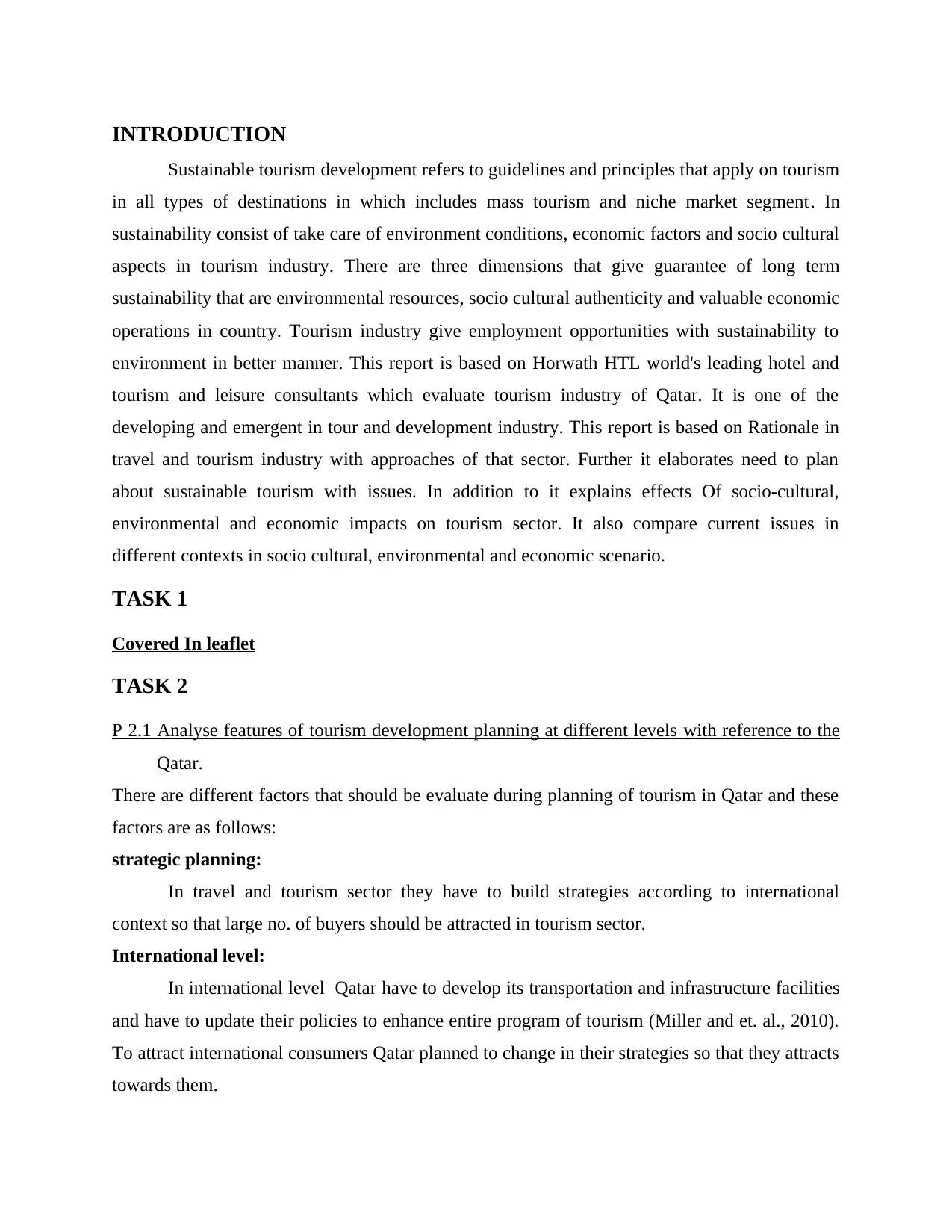
INTRODUCTION
Sustainable tourism development refers to guidelines and principles that apply on tourism
in all types of destinations in which includes mass tourism and niche market segment. In
sustainability consist of take care of environment conditions, economic factors and socio cultural
aspects in tourism industry. There are three dimensions that give guarantee of long term
sustainability that are environmental resources, socio cultural authenticity and valuable economic
operations in country. Tourism industry give employment opportunities with sustainability to
environment in better manner. This report is based on Horwath HTL world's leading hotel and
tourism and leisure consultants which evaluate tourism industry of Qatar. It is one of the
developing and emergent in tour and development industry. This report is based on Rationale in
travel and tourism industry with approaches of that sector. Further it elaborates need to plan
about sustainable tourism with issues. In addition to it explains effects Of socio-cultural,
environmental and economic impacts on tourism sector. It also compare current issues in
different contexts in socio cultural, environmental and economic scenario.
TASK 1
Covered In leaflet
TASK 2
P 2.1 Analyse features of tourism development planning at different levels with reference to the
Qatar.
There are different factors that should be evaluate during planning of tourism in Qatar and these
factors are as follows:
strategic planning:
In travel and tourism sector they have to build strategies according to international
context so that large no. of buyers should be attracted in tourism sector.
International level:
In international level Qatar have to develop its transportation and infrastructure facilities
and have to update their policies to enhance entire program of tourism (Miller and et. al., 2010).
To attract international consumers Qatar planned to change in their strategies so that they attracts
towards them.
Sustainable tourism development refers to guidelines and principles that apply on tourism
in all types of destinations in which includes mass tourism and niche market segment. In
sustainability consist of take care of environment conditions, economic factors and socio cultural
aspects in tourism industry. There are three dimensions that give guarantee of long term
sustainability that are environmental resources, socio cultural authenticity and valuable economic
operations in country. Tourism industry give employment opportunities with sustainability to
environment in better manner. This report is based on Horwath HTL world's leading hotel and
tourism and leisure consultants which evaluate tourism industry of Qatar. It is one of the
developing and emergent in tour and development industry. This report is based on Rationale in
travel and tourism industry with approaches of that sector. Further it elaborates need to plan
about sustainable tourism with issues. In addition to it explains effects Of socio-cultural,
environmental and economic impacts on tourism sector. It also compare current issues in
different contexts in socio cultural, environmental and economic scenario.
TASK 1
Covered In leaflet
TASK 2
P 2.1 Analyse features of tourism development planning at different levels with reference to the
Qatar.
There are different factors that should be evaluate during planning of tourism in Qatar and these
factors are as follows:
strategic planning:
In travel and tourism sector they have to build strategies according to international
context so that large no. of buyers should be attracted in tourism sector.
International level:
In international level Qatar have to develop its transportation and infrastructure facilities
and have to update their policies to enhance entire program of tourism (Miller and et. al., 2010).
To attract international consumers Qatar planned to change in their strategies so that they attracts
towards them.
Secure Best Marks with AI Grader
Need help grading? Try our AI Grader for instant feedback on your assignments.
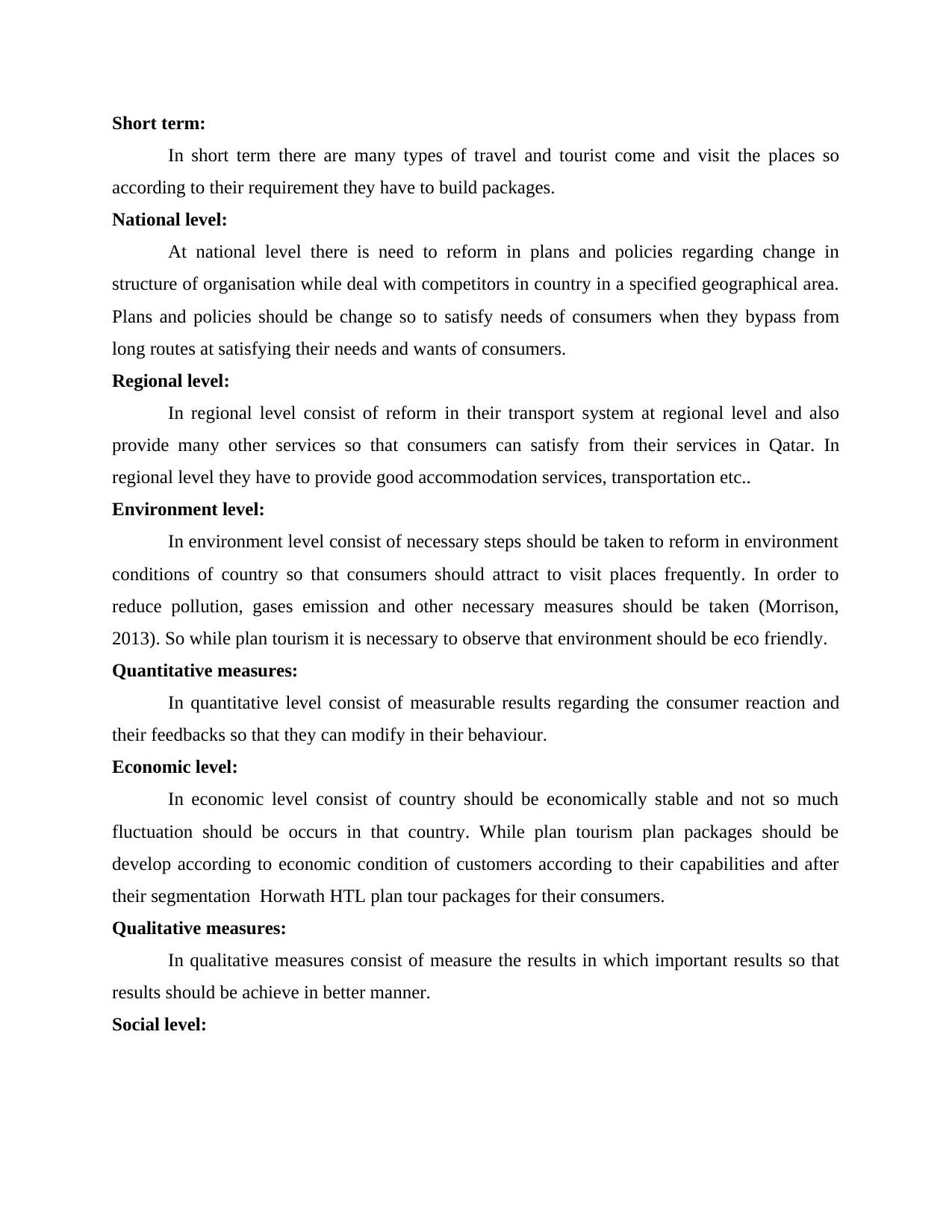
Short term:
In short term there are many types of travel and tourist come and visit the places so
according to their requirement they have to build packages.
National level:
At national level there is need to reform in plans and policies regarding change in
structure of organisation while deal with competitors in country in a specified geographical area.
Plans and policies should be change so to satisfy needs of consumers when they bypass from
long routes at satisfying their needs and wants of consumers.
Regional level:
In regional level consist of reform in their transport system at regional level and also
provide many other services so that consumers can satisfy from their services in Qatar. In
regional level they have to provide good accommodation services, transportation etc..
Environment level:
In environment level consist of necessary steps should be taken to reform in environment
conditions of country so that consumers should attract to visit places frequently. In order to
reduce pollution, gases emission and other necessary measures should be taken (Morrison,
2013). So while plan tourism it is necessary to observe that environment should be eco friendly.
Quantitative measures:
In quantitative level consist of measurable results regarding the consumer reaction and
their feedbacks so that they can modify in their behaviour.
Economic level:
In economic level consist of country should be economically stable and not so much
fluctuation should be occurs in that country. While plan tourism plan packages should be
develop according to economic condition of customers according to their capabilities and after
their segmentation Horwath HTL plan tour packages for their consumers.
Qualitative measures:
In qualitative measures consist of measure the results in which important results so that
results should be achieve in better manner.
Social level:
In short term there are many types of travel and tourist come and visit the places so
according to their requirement they have to build packages.
National level:
At national level there is need to reform in plans and policies regarding change in
structure of organisation while deal with competitors in country in a specified geographical area.
Plans and policies should be change so to satisfy needs of consumers when they bypass from
long routes at satisfying their needs and wants of consumers.
Regional level:
In regional level consist of reform in their transport system at regional level and also
provide many other services so that consumers can satisfy from their services in Qatar. In
regional level they have to provide good accommodation services, transportation etc..
Environment level:
In environment level consist of necessary steps should be taken to reform in environment
conditions of country so that consumers should attract to visit places frequently. In order to
reduce pollution, gases emission and other necessary measures should be taken (Morrison,
2013). So while plan tourism it is necessary to observe that environment should be eco friendly.
Quantitative measures:
In quantitative level consist of measurable results regarding the consumer reaction and
their feedbacks so that they can modify in their behaviour.
Economic level:
In economic level consist of country should be economically stable and not so much
fluctuation should be occurs in that country. While plan tourism plan packages should be
develop according to economic condition of customers according to their capabilities and after
their segmentation Horwath HTL plan tour packages for their consumers.
Qualitative measures:
In qualitative measures consist of measure the results in which important results so that
results should be achieve in better manner.
Social level:
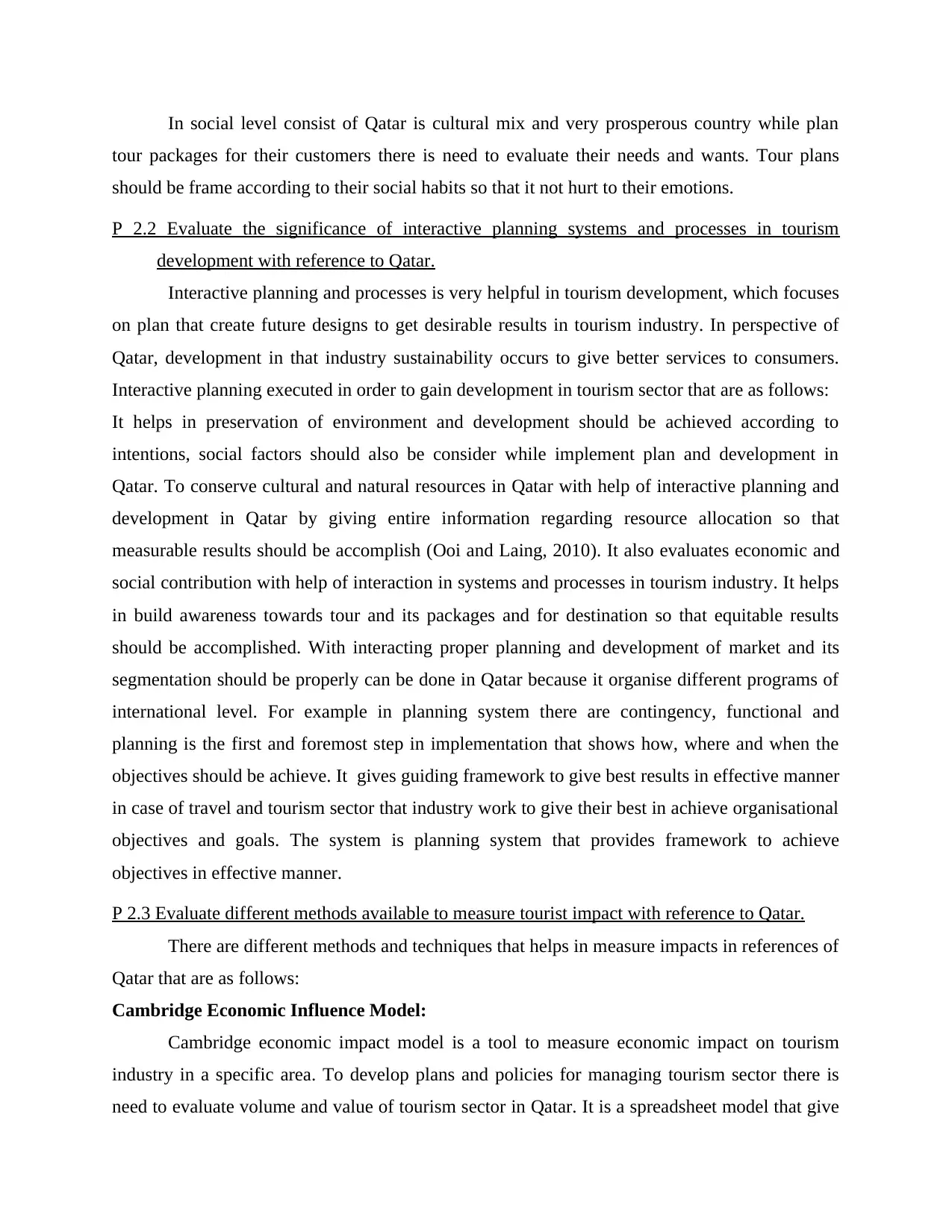
In social level consist of Qatar is cultural mix and very prosperous country while plan
tour packages for their customers there is need to evaluate their needs and wants. Tour plans
should be frame according to their social habits so that it not hurt to their emotions.
P 2.2 Evaluate the significance of interactive planning systems and processes in tourism
development with reference to Qatar.
Interactive planning and processes is very helpful in tourism development, which focuses
on plan that create future designs to get desirable results in tourism industry. In perspective of
Qatar, development in that industry sustainability occurs to give better services to consumers.
Interactive planning executed in order to gain development in tourism sector that are as follows:
It helps in preservation of environment and development should be achieved according to
intentions, social factors should also be consider while implement plan and development in
Qatar. To conserve cultural and natural resources in Qatar with help of interactive planning and
development in Qatar by giving entire information regarding resource allocation so that
measurable results should be accomplish (Ooi and Laing, 2010). It also evaluates economic and
social contribution with help of interaction in systems and processes in tourism industry. It helps
in build awareness towards tour and its packages and for destination so that equitable results
should be accomplished. With interacting proper planning and development of market and its
segmentation should be properly can be done in Qatar because it organise different programs of
international level. For example in planning system there are contingency, functional and
planning is the first and foremost step in implementation that shows how, where and when the
objectives should be achieve. It gives guiding framework to give best results in effective manner
in case of travel and tourism sector that industry work to give their best in achieve organisational
objectives and goals. The system is planning system that provides framework to achieve
objectives in effective manner.
P 2.3 Evaluate different methods available to measure tourist impact with reference to Qatar.
There are different methods and techniques that helps in measure impacts in references of
Qatar that are as follows:
Cambridge Economic Influence Model:
Cambridge economic impact model is a tool to measure economic impact on tourism
industry in a specific area. To develop plans and policies for managing tourism sector there is
need to evaluate volume and value of tourism sector in Qatar. It is a spreadsheet model that give
tour packages for their customers there is need to evaluate their needs and wants. Tour plans
should be frame according to their social habits so that it not hurt to their emotions.
P 2.2 Evaluate the significance of interactive planning systems and processes in tourism
development with reference to Qatar.
Interactive planning and processes is very helpful in tourism development, which focuses
on plan that create future designs to get desirable results in tourism industry. In perspective of
Qatar, development in that industry sustainability occurs to give better services to consumers.
Interactive planning executed in order to gain development in tourism sector that are as follows:
It helps in preservation of environment and development should be achieved according to
intentions, social factors should also be consider while implement plan and development in
Qatar. To conserve cultural and natural resources in Qatar with help of interactive planning and
development in Qatar by giving entire information regarding resource allocation so that
measurable results should be accomplish (Ooi and Laing, 2010). It also evaluates economic and
social contribution with help of interaction in systems and processes in tourism industry. It helps
in build awareness towards tour and its packages and for destination so that equitable results
should be accomplished. With interacting proper planning and development of market and its
segmentation should be properly can be done in Qatar because it organise different programs of
international level. For example in planning system there are contingency, functional and
planning is the first and foremost step in implementation that shows how, where and when the
objectives should be achieve. It gives guiding framework to give best results in effective manner
in case of travel and tourism sector that industry work to give their best in achieve organisational
objectives and goals. The system is planning system that provides framework to achieve
objectives in effective manner.
P 2.3 Evaluate different methods available to measure tourist impact with reference to Qatar.
There are different methods and techniques that helps in measure impacts in references of
Qatar that are as follows:
Cambridge Economic Influence Model:
Cambridge economic impact model is a tool to measure economic impact on tourism
industry in a specific area. To develop plans and policies for managing tourism sector there is
need to evaluate volume and value of tourism sector in Qatar. It is a spreadsheet model that give
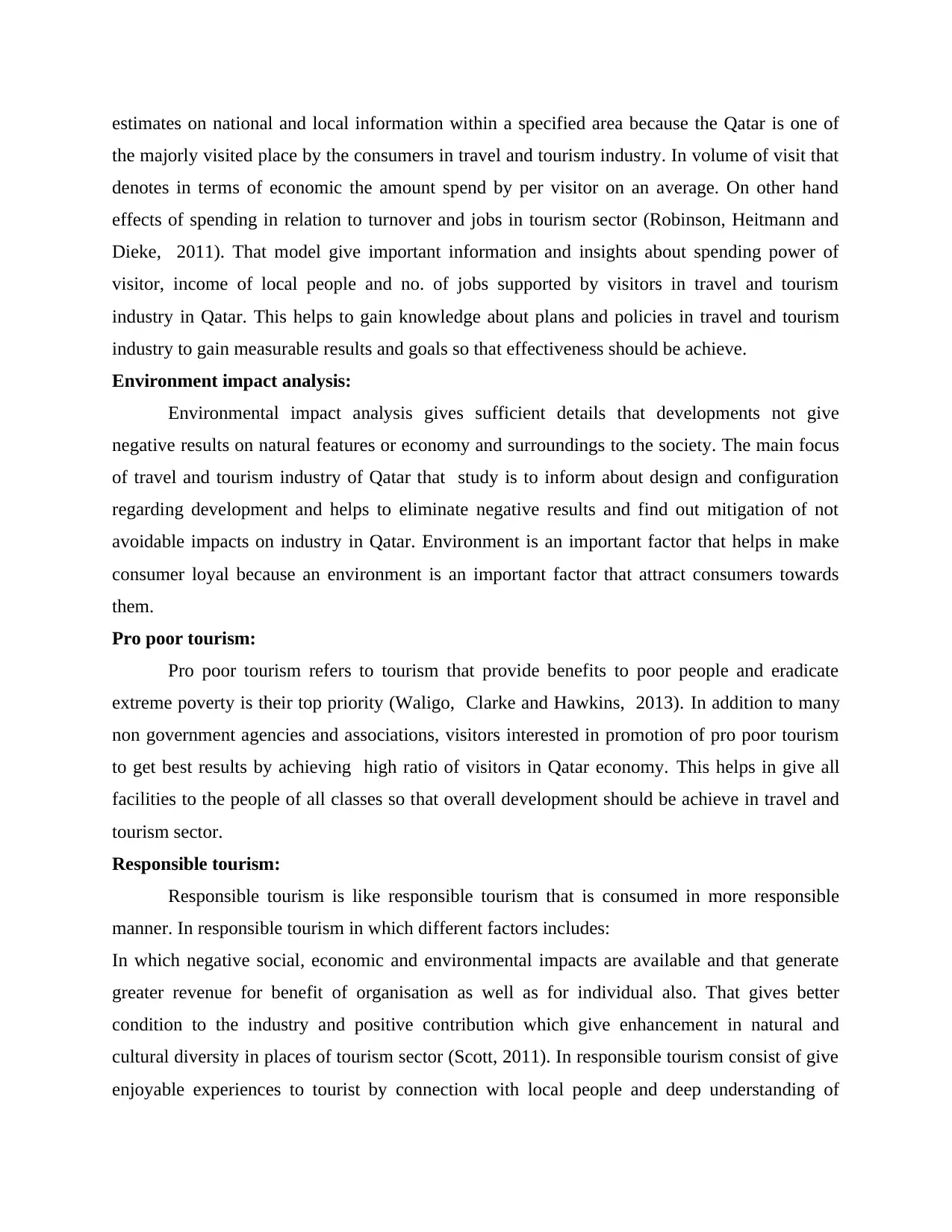
estimates on national and local information within a specified area because the Qatar is one of
the majorly visited place by the consumers in travel and tourism industry. In volume of visit that
denotes in terms of economic the amount spend by per visitor on an average. On other hand
effects of spending in relation to turnover and jobs in tourism sector (Robinson, Heitmann and
Dieke, 2011). That model give important information and insights about spending power of
visitor, income of local people and no. of jobs supported by visitors in travel and tourism
industry in Qatar. This helps to gain knowledge about plans and policies in travel and tourism
industry to gain measurable results and goals so that effectiveness should be achieve.
Environment impact analysis:
Environmental impact analysis gives sufficient details that developments not give
negative results on natural features or economy and surroundings to the society. The main focus
of travel and tourism industry of Qatar that study is to inform about design and configuration
regarding development and helps to eliminate negative results and find out mitigation of not
avoidable impacts on industry in Qatar. Environment is an important factor that helps in make
consumer loyal because an environment is an important factor that attract consumers towards
them.
Pro poor tourism:
Pro poor tourism refers to tourism that provide benefits to poor people and eradicate
extreme poverty is their top priority (Waligo, Clarke and Hawkins, 2013). In addition to many
non government agencies and associations, visitors interested in promotion of pro poor tourism
to get best results by achieving high ratio of visitors in Qatar economy. This helps in give all
facilities to the people of all classes so that overall development should be achieve in travel and
tourism sector.
Responsible tourism:
Responsible tourism is like responsible tourism that is consumed in more responsible
manner. In responsible tourism in which different factors includes:
In which negative social, economic and environmental impacts are available and that generate
greater revenue for benefit of organisation as well as for individual also. That gives better
condition to the industry and positive contribution which give enhancement in natural and
cultural diversity in places of tourism sector (Scott, 2011). In responsible tourism consist of give
enjoyable experiences to tourist by connection with local people and deep understanding of
the majorly visited place by the consumers in travel and tourism industry. In volume of visit that
denotes in terms of economic the amount spend by per visitor on an average. On other hand
effects of spending in relation to turnover and jobs in tourism sector (Robinson, Heitmann and
Dieke, 2011). That model give important information and insights about spending power of
visitor, income of local people and no. of jobs supported by visitors in travel and tourism
industry in Qatar. This helps to gain knowledge about plans and policies in travel and tourism
industry to gain measurable results and goals so that effectiveness should be achieve.
Environment impact analysis:
Environmental impact analysis gives sufficient details that developments not give
negative results on natural features or economy and surroundings to the society. The main focus
of travel and tourism industry of Qatar that study is to inform about design and configuration
regarding development and helps to eliminate negative results and find out mitigation of not
avoidable impacts on industry in Qatar. Environment is an important factor that helps in make
consumer loyal because an environment is an important factor that attract consumers towards
them.
Pro poor tourism:
Pro poor tourism refers to tourism that provide benefits to poor people and eradicate
extreme poverty is their top priority (Waligo, Clarke and Hawkins, 2013). In addition to many
non government agencies and associations, visitors interested in promotion of pro poor tourism
to get best results by achieving high ratio of visitors in Qatar economy. This helps in give all
facilities to the people of all classes so that overall development should be achieve in travel and
tourism sector.
Responsible tourism:
Responsible tourism is like responsible tourism that is consumed in more responsible
manner. In responsible tourism in which different factors includes:
In which negative social, economic and environmental impacts are available and that generate
greater revenue for benefit of organisation as well as for individual also. That gives better
condition to the industry and positive contribution which give enhancement in natural and
cultural diversity in places of tourism sector (Scott, 2011). In responsible tourism consist of give
enjoyable experiences to tourist by connection with local people and deep understanding of
Paraphrase This Document
Need a fresh take? Get an instant paraphrase of this document with our AI Paraphraser
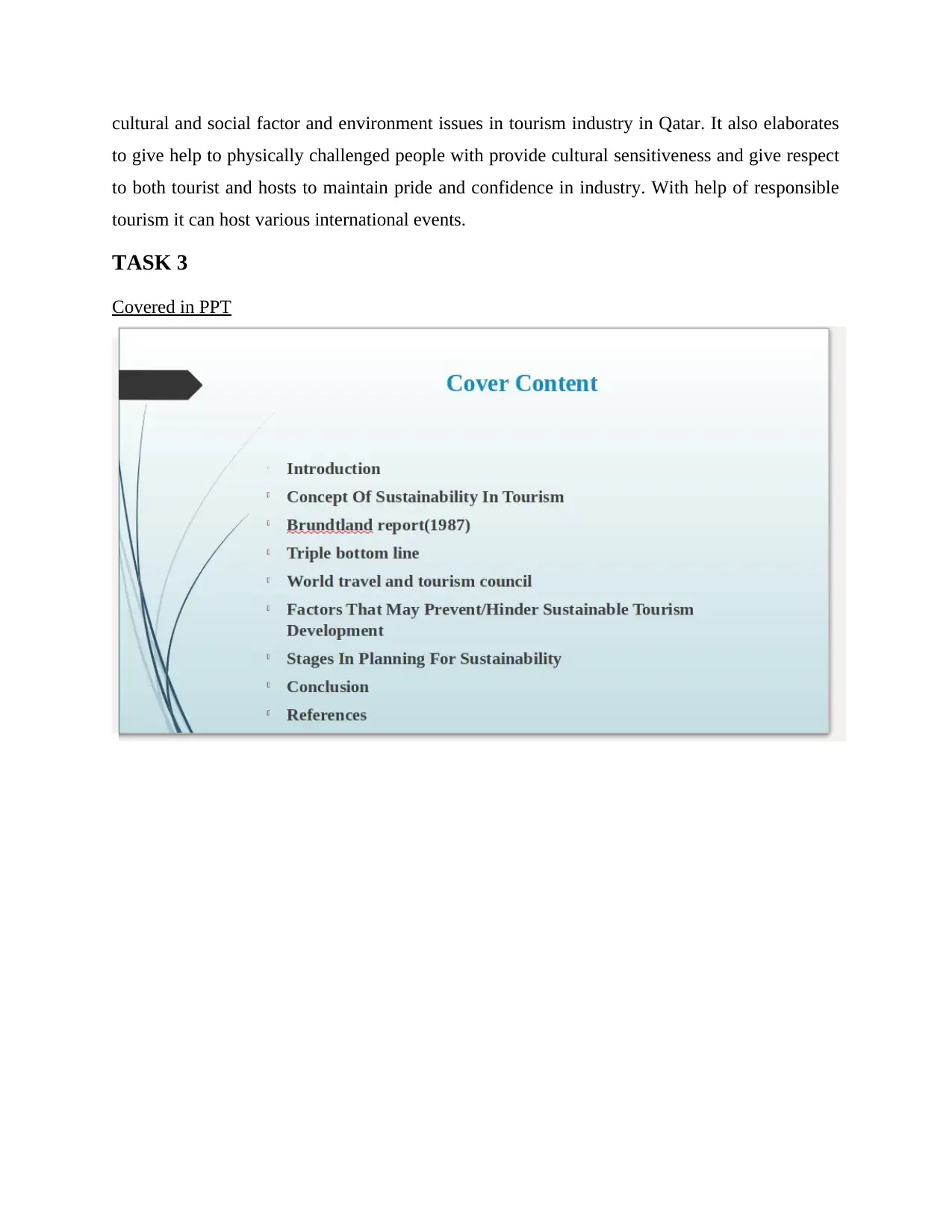
cultural and social factor and environment issues in tourism industry in Qatar. It also elaborates
to give help to physically challenged people with provide cultural sensitiveness and give respect
to both tourist and hosts to maintain pride and confidence in industry. With help of responsible
tourism it can host various international events.
TASK 3
Covered in PPT
to give help to physically challenged people with provide cultural sensitiveness and give respect
to both tourist and hosts to maintain pride and confidence in industry. With help of responsible
tourism it can host various international events.
TASK 3
Covered in PPT
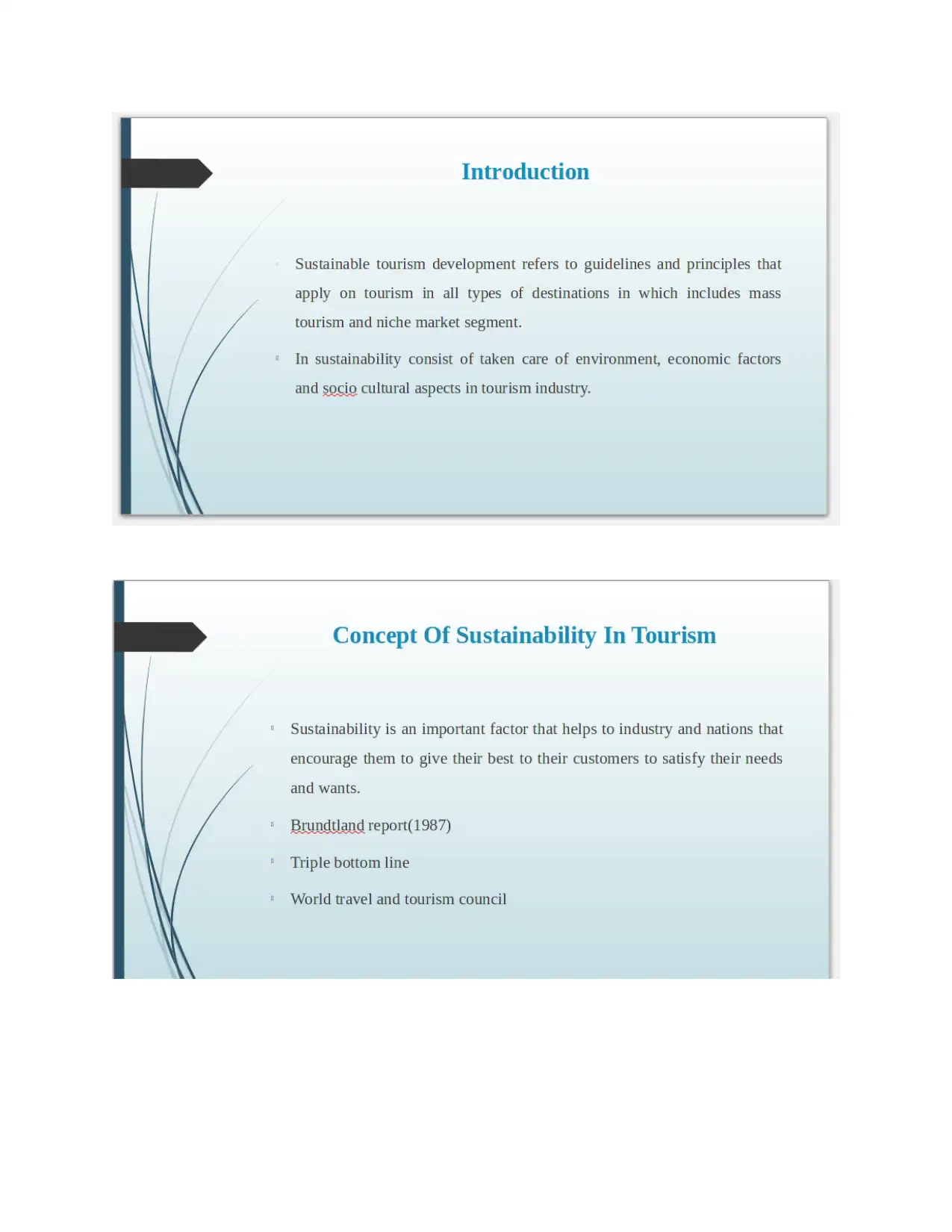
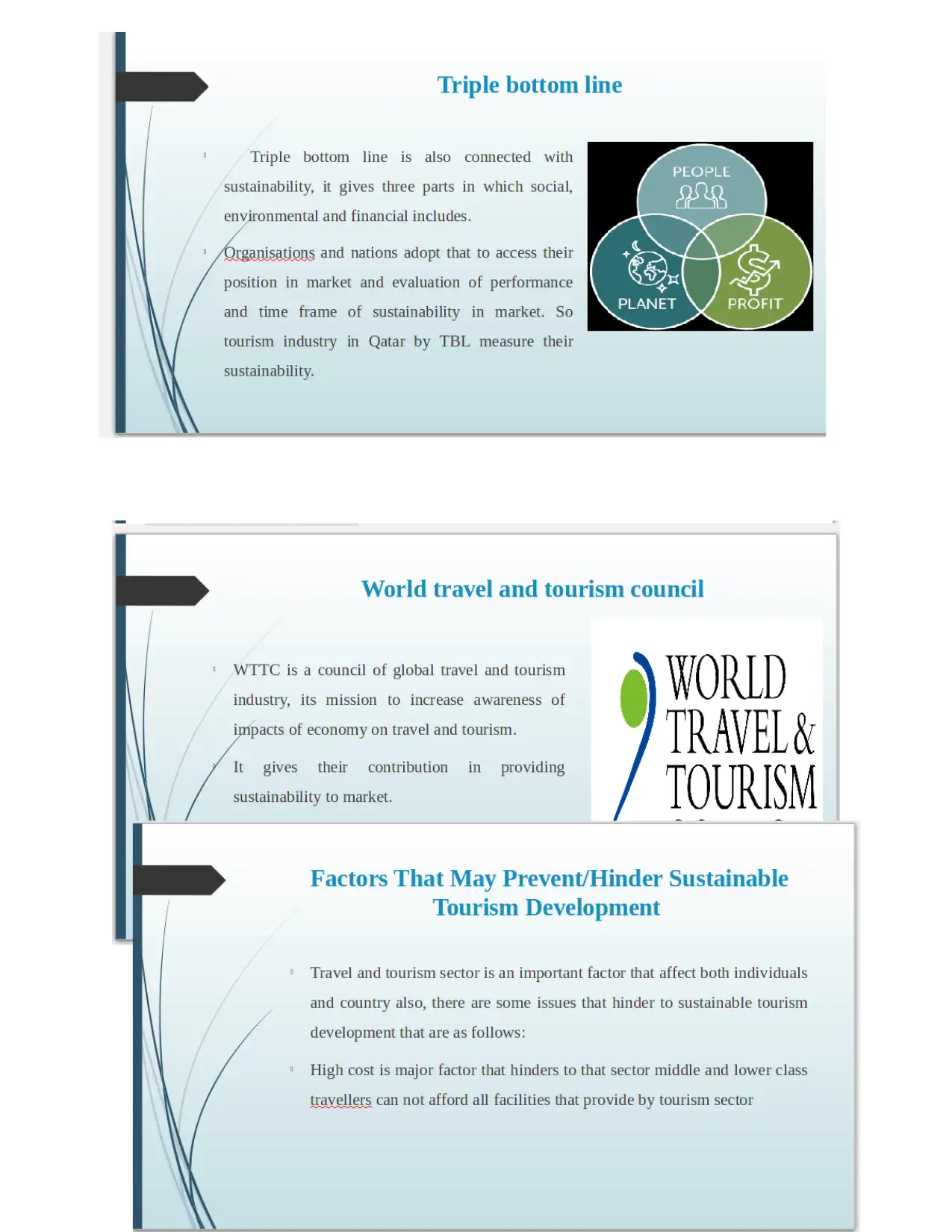
Secure Best Marks with AI Grader
Need help grading? Try our AI Grader for instant feedback on your assignments.
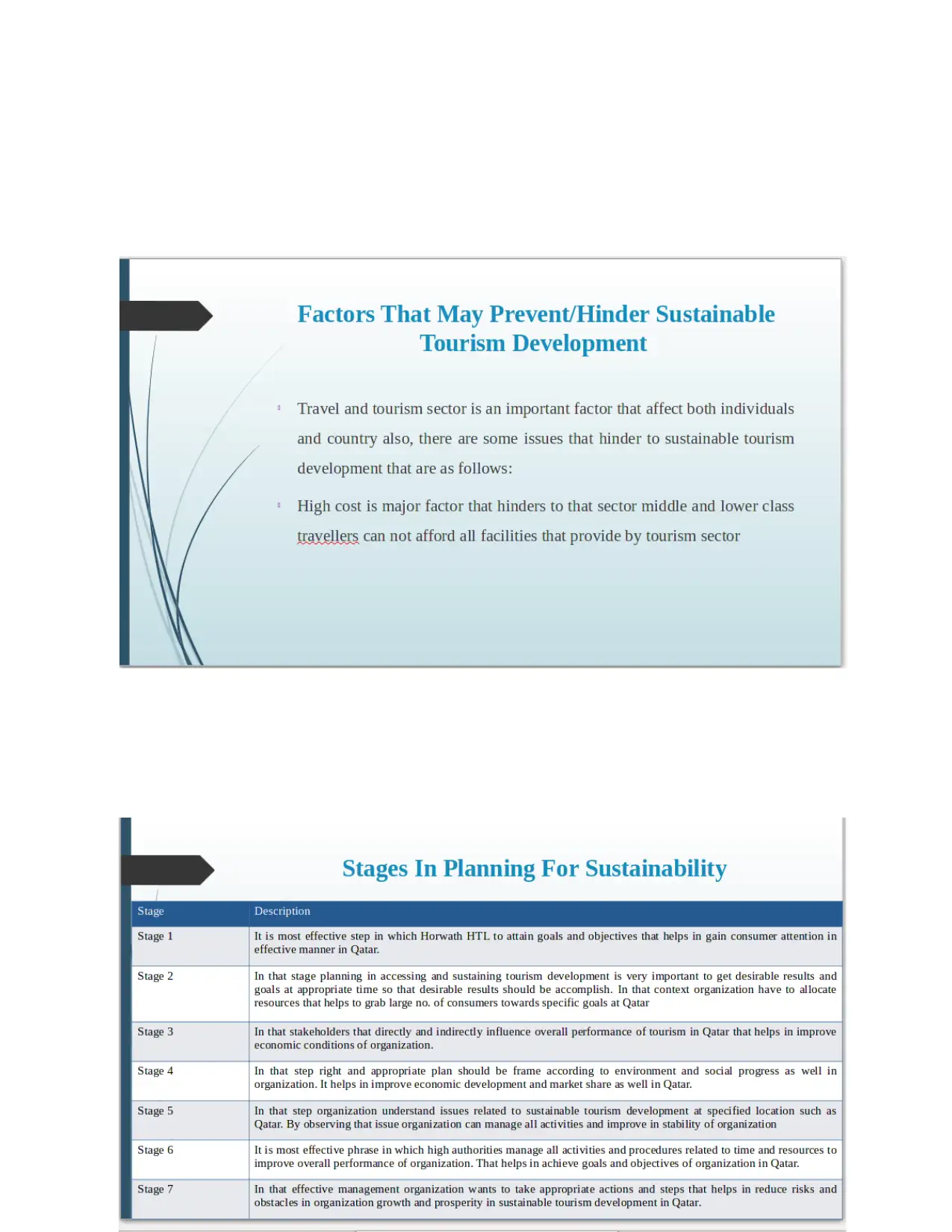
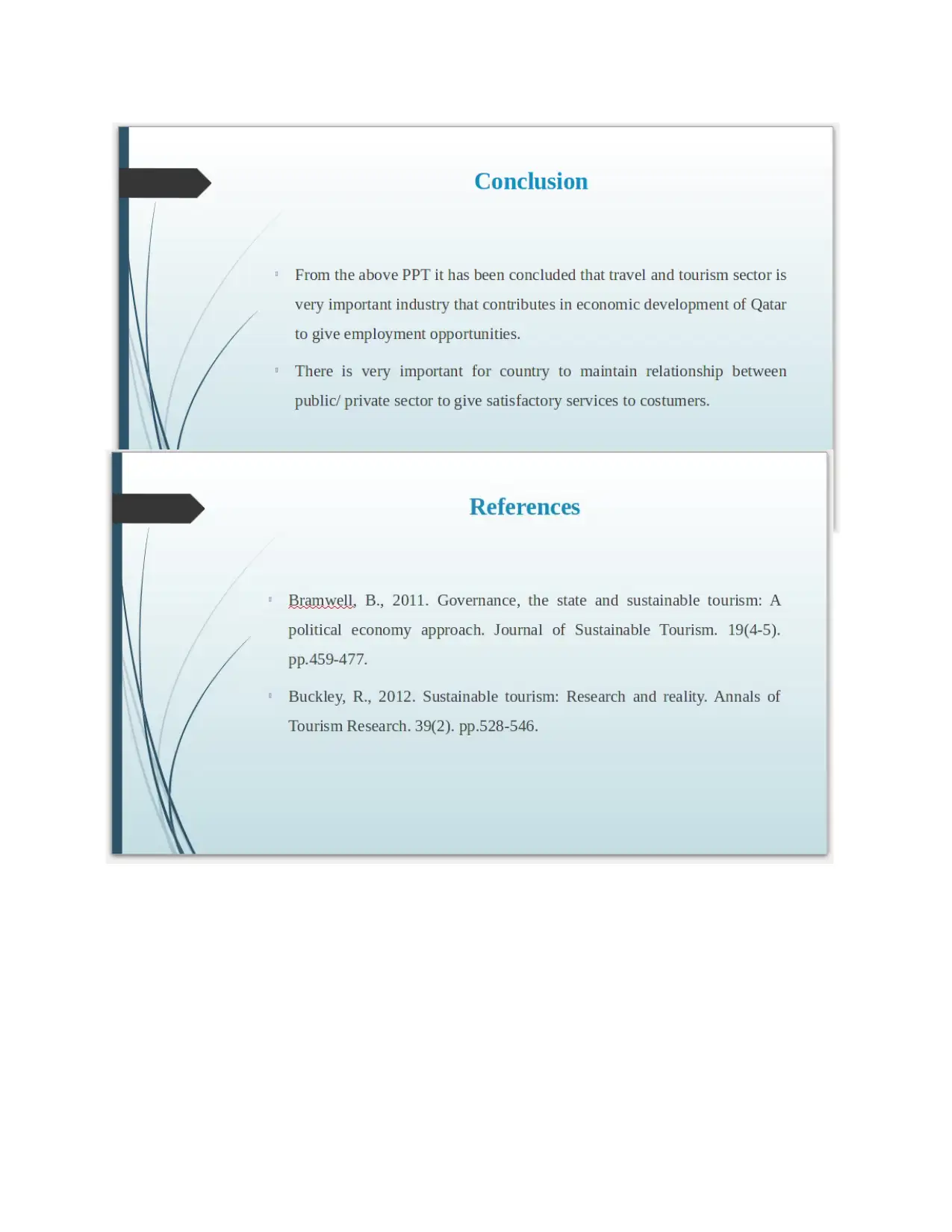
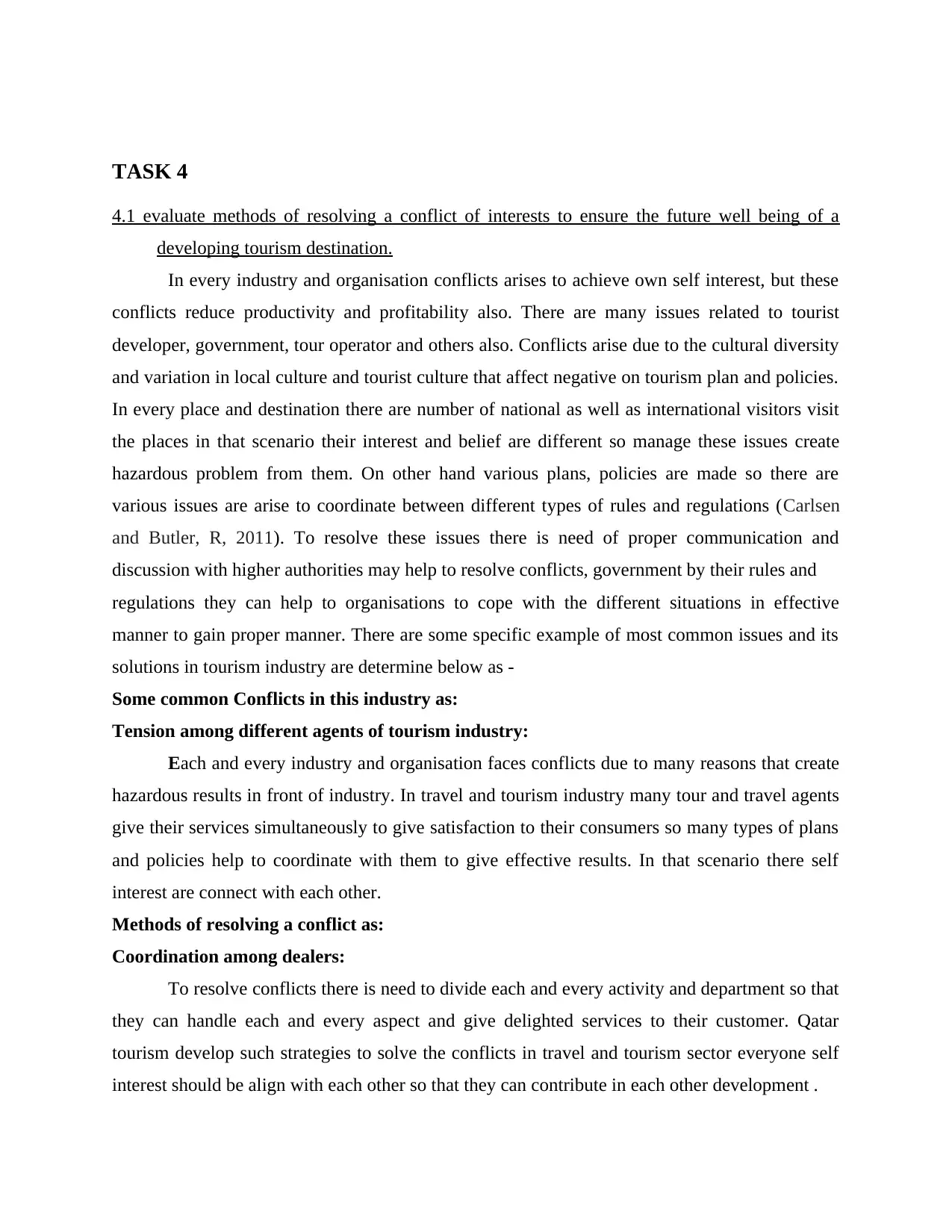
TASK 4
4.1 evaluate methods of resolving a conflict of interests to ensure the future well being of a
developing tourism destination.
In every industry and organisation conflicts arises to achieve own self interest, but these
conflicts reduce productivity and profitability also. There are many issues related to tourist
developer, government, tour operator and others also. Conflicts arise due to the cultural diversity
and variation in local culture and tourist culture that affect negative on tourism plan and policies.
In every place and destination there are number of national as well as international visitors visit
the places in that scenario their interest and belief are different so manage these issues create
hazardous problem from them. On other hand various plans, policies are made so there are
various issues are arise to coordinate between different types of rules and regulations (Carlsen
and Butler, R, 2011). To resolve these issues there is need of proper communication and
discussion with higher authorities may help to resolve conflicts, government by their rules and
regulations they can help to organisations to cope with the different situations in effective
manner to gain proper manner. There are some specific example of most common issues and its
solutions in tourism industry are determine below as -
Some common Conflicts in this industry as:
Tension among different agents of tourism industry:
Each and every industry and organisation faces conflicts due to many reasons that create
hazardous results in front of industry. In travel and tourism industry many tour and travel agents
give their services simultaneously to give satisfaction to their consumers so many types of plans
and policies help to coordinate with them to give effective results. In that scenario there self
interest are connect with each other.
Methods of resolving a conflict as:
Coordination among dealers:
To resolve conflicts there is need to divide each and every activity and department so that
they can handle each and every aspect and give delighted services to their customer. Qatar
tourism develop such strategies to solve the conflicts in travel and tourism sector everyone self
interest should be align with each other so that they can contribute in each other development .
4.1 evaluate methods of resolving a conflict of interests to ensure the future well being of a
developing tourism destination.
In every industry and organisation conflicts arises to achieve own self interest, but these
conflicts reduce productivity and profitability also. There are many issues related to tourist
developer, government, tour operator and others also. Conflicts arise due to the cultural diversity
and variation in local culture and tourist culture that affect negative on tourism plan and policies.
In every place and destination there are number of national as well as international visitors visit
the places in that scenario their interest and belief are different so manage these issues create
hazardous problem from them. On other hand various plans, policies are made so there are
various issues are arise to coordinate between different types of rules and regulations (Carlsen
and Butler, R, 2011). To resolve these issues there is need of proper communication and
discussion with higher authorities may help to resolve conflicts, government by their rules and
regulations they can help to organisations to cope with the different situations in effective
manner to gain proper manner. There are some specific example of most common issues and its
solutions in tourism industry are determine below as -
Some common Conflicts in this industry as:
Tension among different agents of tourism industry:
Each and every industry and organisation faces conflicts due to many reasons that create
hazardous results in front of industry. In travel and tourism industry many tour and travel agents
give their services simultaneously to give satisfaction to their consumers so many types of plans
and policies help to coordinate with them to give effective results. In that scenario there self
interest are connect with each other.
Methods of resolving a conflict as:
Coordination among dealers:
To resolve conflicts there is need to divide each and every activity and department so that
they can handle each and every aspect and give delighted services to their customer. Qatar
tourism develop such strategies to solve the conflicts in travel and tourism sector everyone self
interest should be align with each other so that they can contribute in each other development .
Paraphrase This Document
Need a fresh take? Get an instant paraphrase of this document with our AI Paraphraser
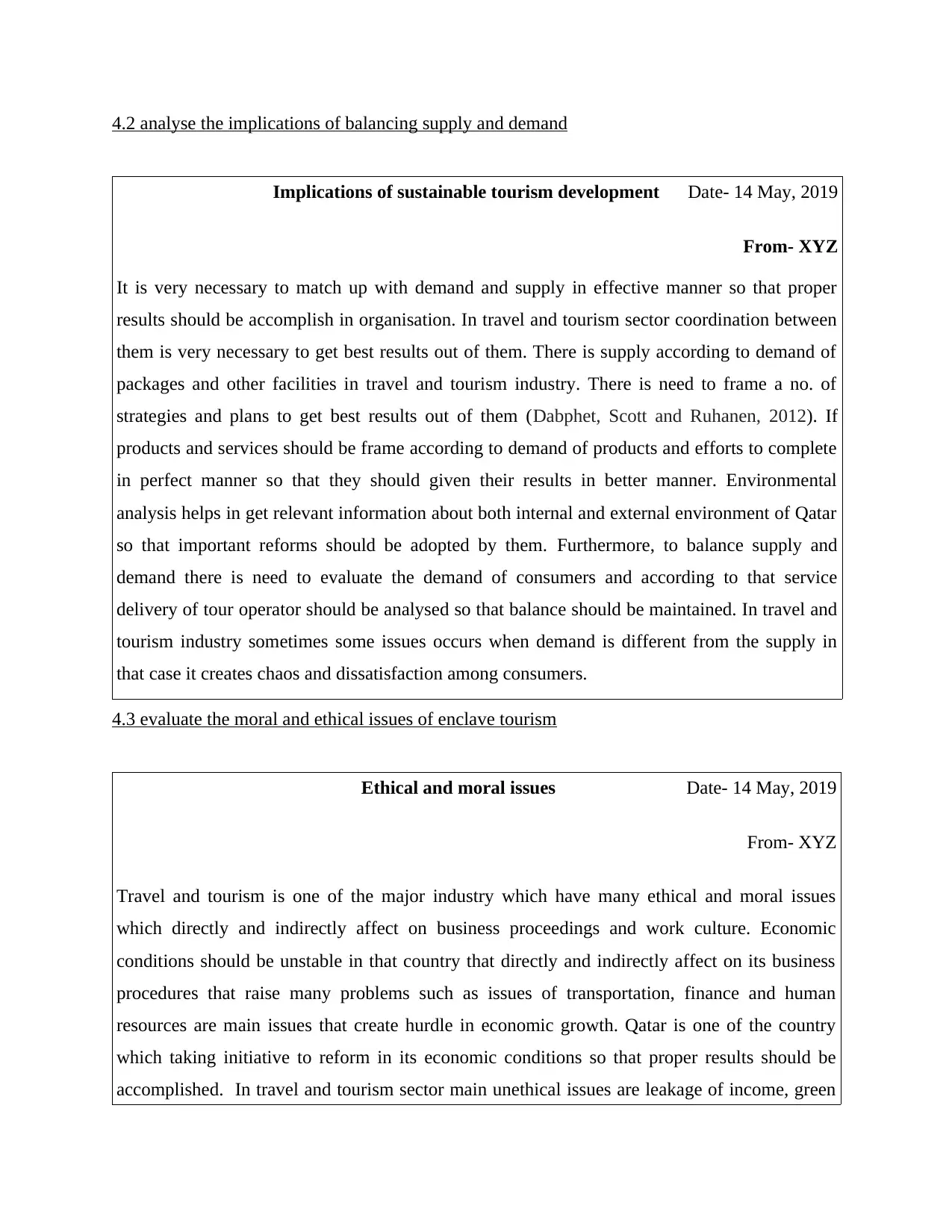
4.2 analyse the implications of balancing supply and demand
Implications of sustainable tourism development Date- 14 May, 2019
From- XYZ
It is very necessary to match up with demand and supply in effective manner so that proper
results should be accomplish in organisation. In travel and tourism sector coordination between
them is very necessary to get best results out of them. There is supply according to demand of
packages and other facilities in travel and tourism industry. There is need to frame a no. of
strategies and plans to get best results out of them (Dabphet, Scott and Ruhanen, 2012). If
products and services should be frame according to demand of products and efforts to complete
in perfect manner so that they should given their results in better manner. Environmental
analysis helps in get relevant information about both internal and external environment of Qatar
so that important reforms should be adopted by them. Furthermore, to balance supply and
demand there is need to evaluate the demand of consumers and according to that service
delivery of tour operator should be analysed so that balance should be maintained. In travel and
tourism industry sometimes some issues occurs when demand is different from the supply in
that case it creates chaos and dissatisfaction among consumers.
4.3 evaluate the moral and ethical issues of enclave tourism
Ethical and moral issues Date- 14 May, 2019
From- XYZ
Travel and tourism is one of the major industry which have many ethical and moral issues
which directly and indirectly affect on business proceedings and work culture. Economic
conditions should be unstable in that country that directly and indirectly affect on its business
procedures that raise many problems such as issues of transportation, finance and human
resources are main issues that create hurdle in economic growth. Qatar is one of the country
which taking initiative to reform in its economic conditions so that proper results should be
accomplished. In travel and tourism sector main unethical issues are leakage of income, green
Implications of sustainable tourism development Date- 14 May, 2019
From- XYZ
It is very necessary to match up with demand and supply in effective manner so that proper
results should be accomplish in organisation. In travel and tourism sector coordination between
them is very necessary to get best results out of them. There is supply according to demand of
packages and other facilities in travel and tourism industry. There is need to frame a no. of
strategies and plans to get best results out of them (Dabphet, Scott and Ruhanen, 2012). If
products and services should be frame according to demand of products and efforts to complete
in perfect manner so that they should given their results in better manner. Environmental
analysis helps in get relevant information about both internal and external environment of Qatar
so that important reforms should be adopted by them. Furthermore, to balance supply and
demand there is need to evaluate the demand of consumers and according to that service
delivery of tour operator should be analysed so that balance should be maintained. In travel and
tourism industry sometimes some issues occurs when demand is different from the supply in
that case it creates chaos and dissatisfaction among consumers.
4.3 evaluate the moral and ethical issues of enclave tourism
Ethical and moral issues Date- 14 May, 2019
From- XYZ
Travel and tourism is one of the major industry which have many ethical and moral issues
which directly and indirectly affect on business proceedings and work culture. Economic
conditions should be unstable in that country that directly and indirectly affect on its business
procedures that raise many problems such as issues of transportation, finance and human
resources are main issues that create hurdle in economic growth. Qatar is one of the country
which taking initiative to reform in its economic conditions so that proper results should be
accomplished. In travel and tourism sector main unethical issues are leakage of income, green
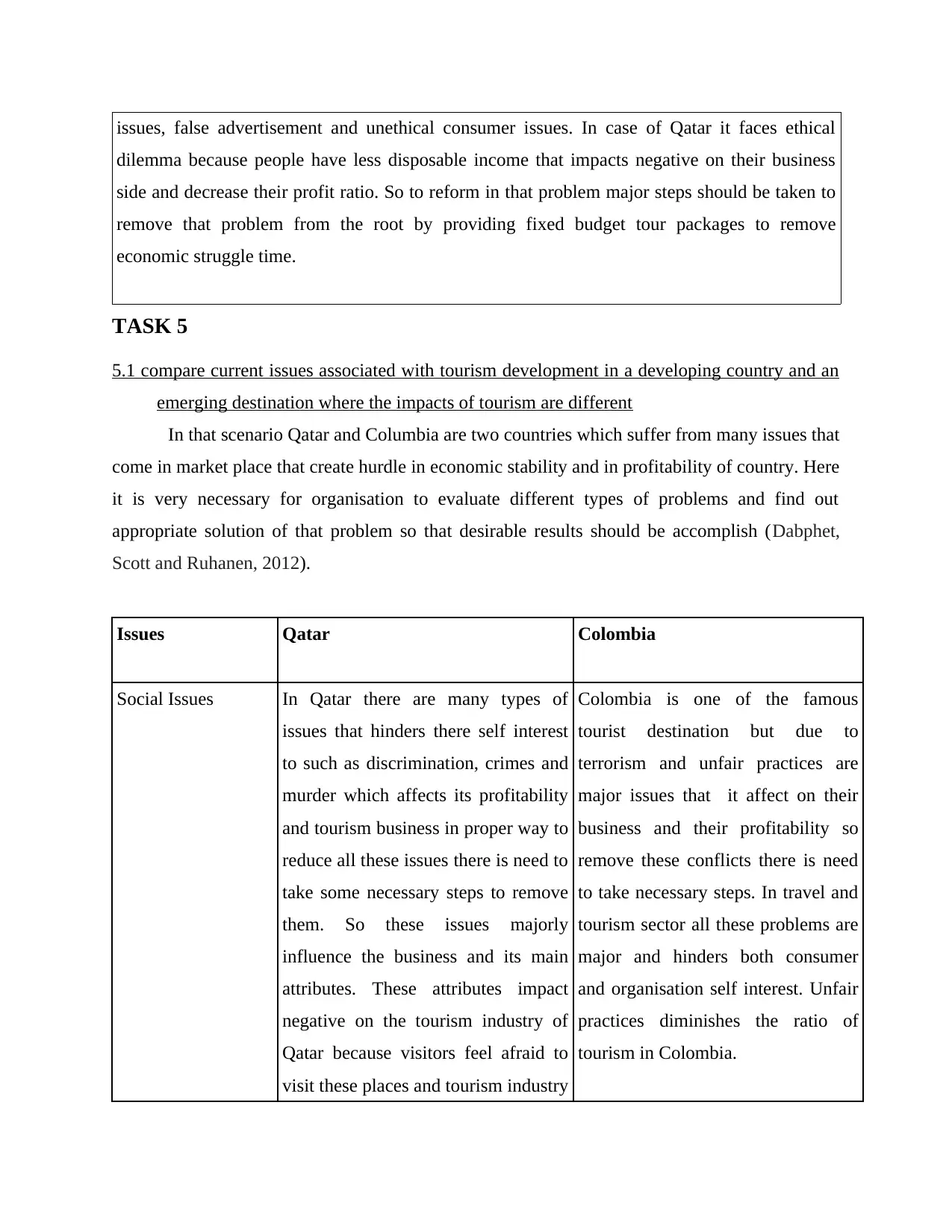
issues, false advertisement and unethical consumer issues. In case of Qatar it faces ethical
dilemma because people have less disposable income that impacts negative on their business
side and decrease their profit ratio. So to reform in that problem major steps should be taken to
remove that problem from the root by providing fixed budget tour packages to remove
economic struggle time.
TASK 5
5.1 compare current issues associated with tourism development in a developing country and an
emerging destination where the impacts of tourism are different
In that scenario Qatar and Columbia are two countries which suffer from many issues that
come in market place that create hurdle in economic stability and in profitability of country. Here
it is very necessary for organisation to evaluate different types of problems and find out
appropriate solution of that problem so that desirable results should be accomplish (Dabphet,
Scott and Ruhanen, 2012).
Issues Qatar Colombia
Social Issues In Qatar there are many types of
issues that hinders there self interest
to such as discrimination, crimes and
murder which affects its profitability
and tourism business in proper way to
reduce all these issues there is need to
take some necessary steps to remove
them. So these issues majorly
influence the business and its main
attributes. These attributes impact
negative on the tourism industry of
Qatar because visitors feel afraid to
visit these places and tourism industry
Colombia is one of the famous
tourist destination but due to
terrorism and unfair practices are
major issues that it affect on their
business and their profitability so
remove these conflicts there is need
to take necessary steps. In travel and
tourism sector all these problems are
major and hinders both consumer
and organisation self interest. Unfair
practices diminishes the ratio of
tourism in Colombia.
dilemma because people have less disposable income that impacts negative on their business
side and decrease their profit ratio. So to reform in that problem major steps should be taken to
remove that problem from the root by providing fixed budget tour packages to remove
economic struggle time.
TASK 5
5.1 compare current issues associated with tourism development in a developing country and an
emerging destination where the impacts of tourism are different
In that scenario Qatar and Columbia are two countries which suffer from many issues that
come in market place that create hurdle in economic stability and in profitability of country. Here
it is very necessary for organisation to evaluate different types of problems and find out
appropriate solution of that problem so that desirable results should be accomplish (Dabphet,
Scott and Ruhanen, 2012).
Issues Qatar Colombia
Social Issues In Qatar there are many types of
issues that hinders there self interest
to such as discrimination, crimes and
murder which affects its profitability
and tourism business in proper way to
reduce all these issues there is need to
take some necessary steps to remove
them. So these issues majorly
influence the business and its main
attributes. These attributes impact
negative on the tourism industry of
Qatar because visitors feel afraid to
visit these places and tourism industry
Colombia is one of the famous
tourist destination but due to
terrorism and unfair practices are
major issues that it affect on their
business and their profitability so
remove these conflicts there is need
to take necessary steps. In travel and
tourism sector all these problems are
major and hinders both consumer
and organisation self interest. Unfair
practices diminishes the ratio of
tourism in Colombia.
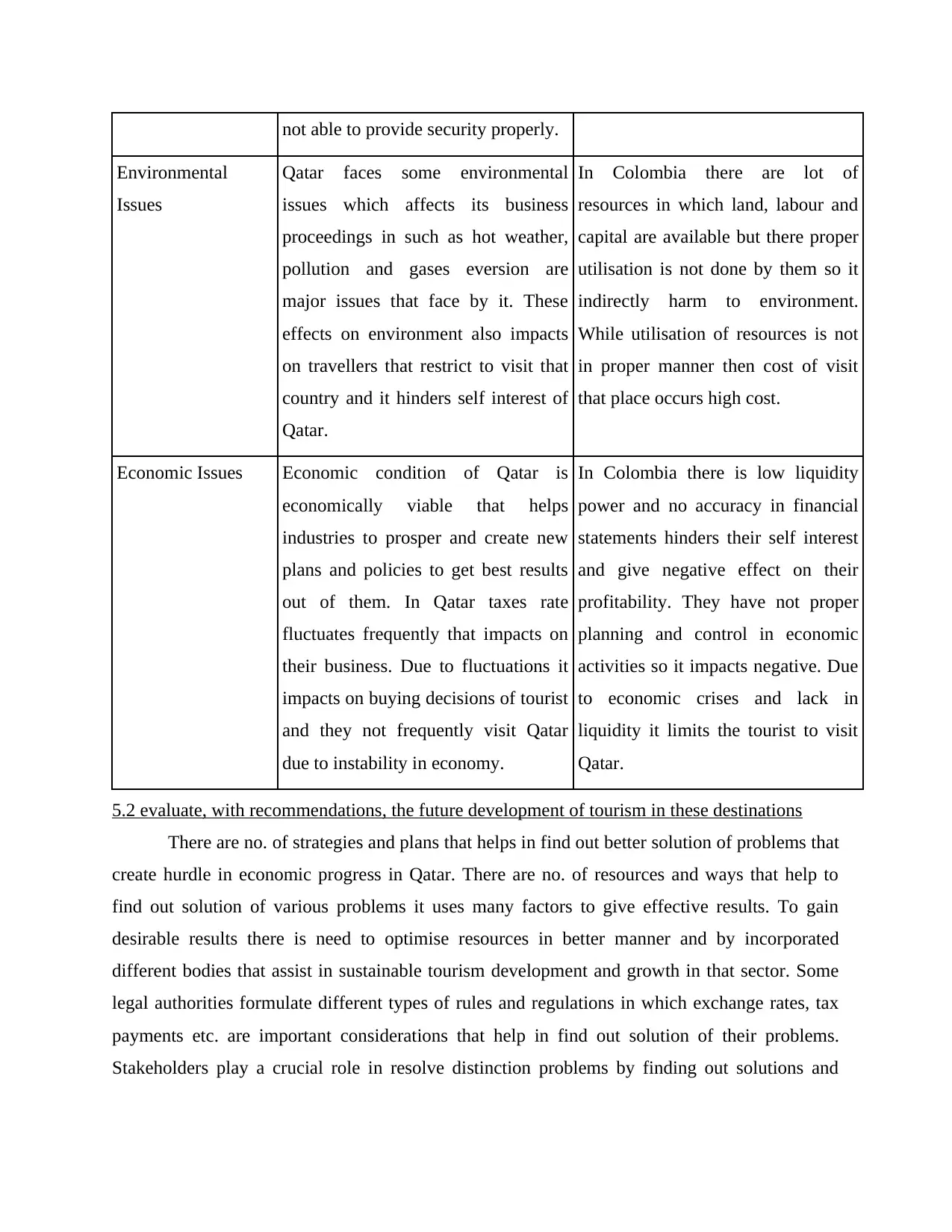
not able to provide security properly.
Environmental
Issues
Qatar faces some environmental
issues which affects its business
proceedings in such as hot weather,
pollution and gases eversion are
major issues that face by it. These
effects on environment also impacts
on travellers that restrict to visit that
country and it hinders self interest of
Qatar.
In Colombia there are lot of
resources in which land, labour and
capital are available but there proper
utilisation is not done by them so it
indirectly harm to environment.
While utilisation of resources is not
in proper manner then cost of visit
that place occurs high cost.
Economic Issues Economic condition of Qatar is
economically viable that helps
industries to prosper and create new
plans and policies to get best results
out of them. In Qatar taxes rate
fluctuates frequently that impacts on
their business. Due to fluctuations it
impacts on buying decisions of tourist
and they not frequently visit Qatar
due to instability in economy.
In Colombia there is low liquidity
power and no accuracy in financial
statements hinders their self interest
and give negative effect on their
profitability. They have not proper
planning and control in economic
activities so it impacts negative. Due
to economic crises and lack in
liquidity it limits the tourist to visit
Qatar.
5.2 evaluate, with recommendations, the future development of tourism in these destinations
There are no. of strategies and plans that helps in find out better solution of problems that
create hurdle in economic progress in Qatar. There are no. of resources and ways that help to
find out solution of various problems it uses many factors to give effective results. To gain
desirable results there is need to optimise resources in better manner and by incorporated
different bodies that assist in sustainable tourism development and growth in that sector. Some
legal authorities formulate different types of rules and regulations in which exchange rates, tax
payments etc. are important considerations that help in find out solution of their problems.
Stakeholders play a crucial role in resolve distinction problems by finding out solutions and
Environmental
Issues
Qatar faces some environmental
issues which affects its business
proceedings in such as hot weather,
pollution and gases eversion are
major issues that face by it. These
effects on environment also impacts
on travellers that restrict to visit that
country and it hinders self interest of
Qatar.
In Colombia there are lot of
resources in which land, labour and
capital are available but there proper
utilisation is not done by them so it
indirectly harm to environment.
While utilisation of resources is not
in proper manner then cost of visit
that place occurs high cost.
Economic Issues Economic condition of Qatar is
economically viable that helps
industries to prosper and create new
plans and policies to get best results
out of them. In Qatar taxes rate
fluctuates frequently that impacts on
their business. Due to fluctuations it
impacts on buying decisions of tourist
and they not frequently visit Qatar
due to instability in economy.
In Colombia there is low liquidity
power and no accuracy in financial
statements hinders their self interest
and give negative effect on their
profitability. They have not proper
planning and control in economic
activities so it impacts negative. Due
to economic crises and lack in
liquidity it limits the tourist to visit
Qatar.
5.2 evaluate, with recommendations, the future development of tourism in these destinations
There are no. of strategies and plans that helps in find out better solution of problems that
create hurdle in economic progress in Qatar. There are no. of resources and ways that help to
find out solution of various problems it uses many factors to give effective results. To gain
desirable results there is need to optimise resources in better manner and by incorporated
different bodies that assist in sustainable tourism development and growth in that sector. Some
legal authorities formulate different types of rules and regulations in which exchange rates, tax
payments etc. are important considerations that help in find out solution of their problems.
Stakeholders play a crucial role in resolve distinction problems by finding out solutions and
Secure Best Marks with AI Grader
Need help grading? Try our AI Grader for instant feedback on your assignments.
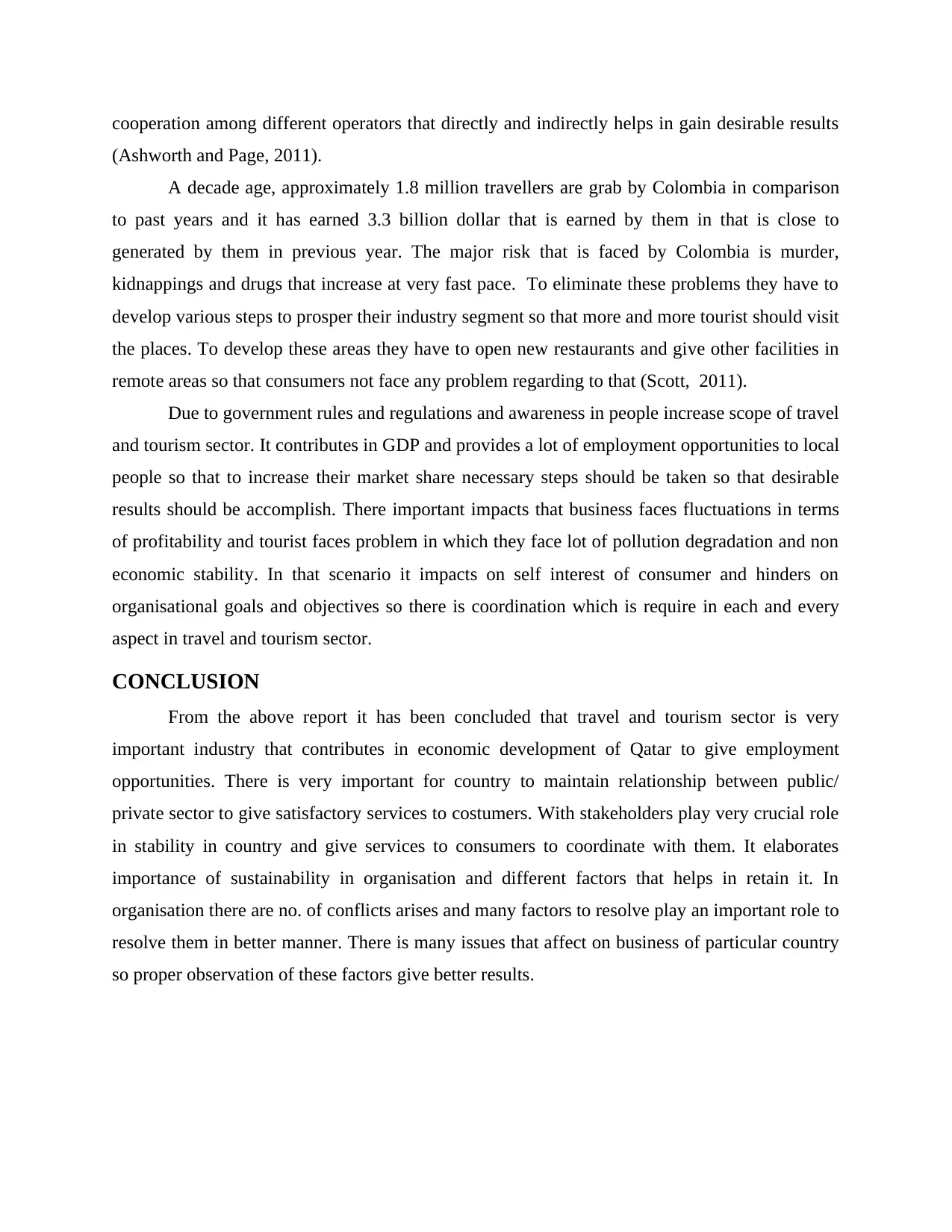
cooperation among different operators that directly and indirectly helps in gain desirable results
(Ashworth and Page, 2011).
A decade age, approximately 1.8 million travellers are grab by Colombia in comparison
to past years and it has earned 3.3 billion dollar that is earned by them in that is close to
generated by them in previous year. The major risk that is faced by Colombia is murder,
kidnappings and drugs that increase at very fast pace. To eliminate these problems they have to
develop various steps to prosper their industry segment so that more and more tourist should visit
the places. To develop these areas they have to open new restaurants and give other facilities in
remote areas so that consumers not face any problem regarding to that (Scott, 2011).
Due to government rules and regulations and awareness in people increase scope of travel
and tourism sector. It contributes in GDP and provides a lot of employment opportunities to local
people so that to increase their market share necessary steps should be taken so that desirable
results should be accomplish. There important impacts that business faces fluctuations in terms
of profitability and tourist faces problem in which they face lot of pollution degradation and non
economic stability. In that scenario it impacts on self interest of consumer and hinders on
organisational goals and objectives so there is coordination which is require in each and every
aspect in travel and tourism sector.
CONCLUSION
From the above report it has been concluded that travel and tourism sector is very
important industry that contributes in economic development of Qatar to give employment
opportunities. There is very important for country to maintain relationship between public/
private sector to give satisfactory services to costumers. With stakeholders play very crucial role
in stability in country and give services to consumers to coordinate with them. It elaborates
importance of sustainability in organisation and different factors that helps in retain it. In
organisation there are no. of conflicts arises and many factors to resolve play an important role to
resolve them in better manner. There is many issues that affect on business of particular country
so proper observation of these factors give better results.
(Ashworth and Page, 2011).
A decade age, approximately 1.8 million travellers are grab by Colombia in comparison
to past years and it has earned 3.3 billion dollar that is earned by them in that is close to
generated by them in previous year. The major risk that is faced by Colombia is murder,
kidnappings and drugs that increase at very fast pace. To eliminate these problems they have to
develop various steps to prosper their industry segment so that more and more tourist should visit
the places. To develop these areas they have to open new restaurants and give other facilities in
remote areas so that consumers not face any problem regarding to that (Scott, 2011).
Due to government rules and regulations and awareness in people increase scope of travel
and tourism sector. It contributes in GDP and provides a lot of employment opportunities to local
people so that to increase their market share necessary steps should be taken so that desirable
results should be accomplish. There important impacts that business faces fluctuations in terms
of profitability and tourist faces problem in which they face lot of pollution degradation and non
economic stability. In that scenario it impacts on self interest of consumer and hinders on
organisational goals and objectives so there is coordination which is require in each and every
aspect in travel and tourism sector.
CONCLUSION
From the above report it has been concluded that travel and tourism sector is very
important industry that contributes in economic development of Qatar to give employment
opportunities. There is very important for country to maintain relationship between public/
private sector to give satisfactory services to costumers. With stakeholders play very crucial role
in stability in country and give services to consumers to coordinate with them. It elaborates
importance of sustainability in organisation and different factors that helps in retain it. In
organisation there are no. of conflicts arises and many factors to resolve play an important role to
resolve them in better manner. There is many issues that affect on business of particular country
so proper observation of these factors give better results.
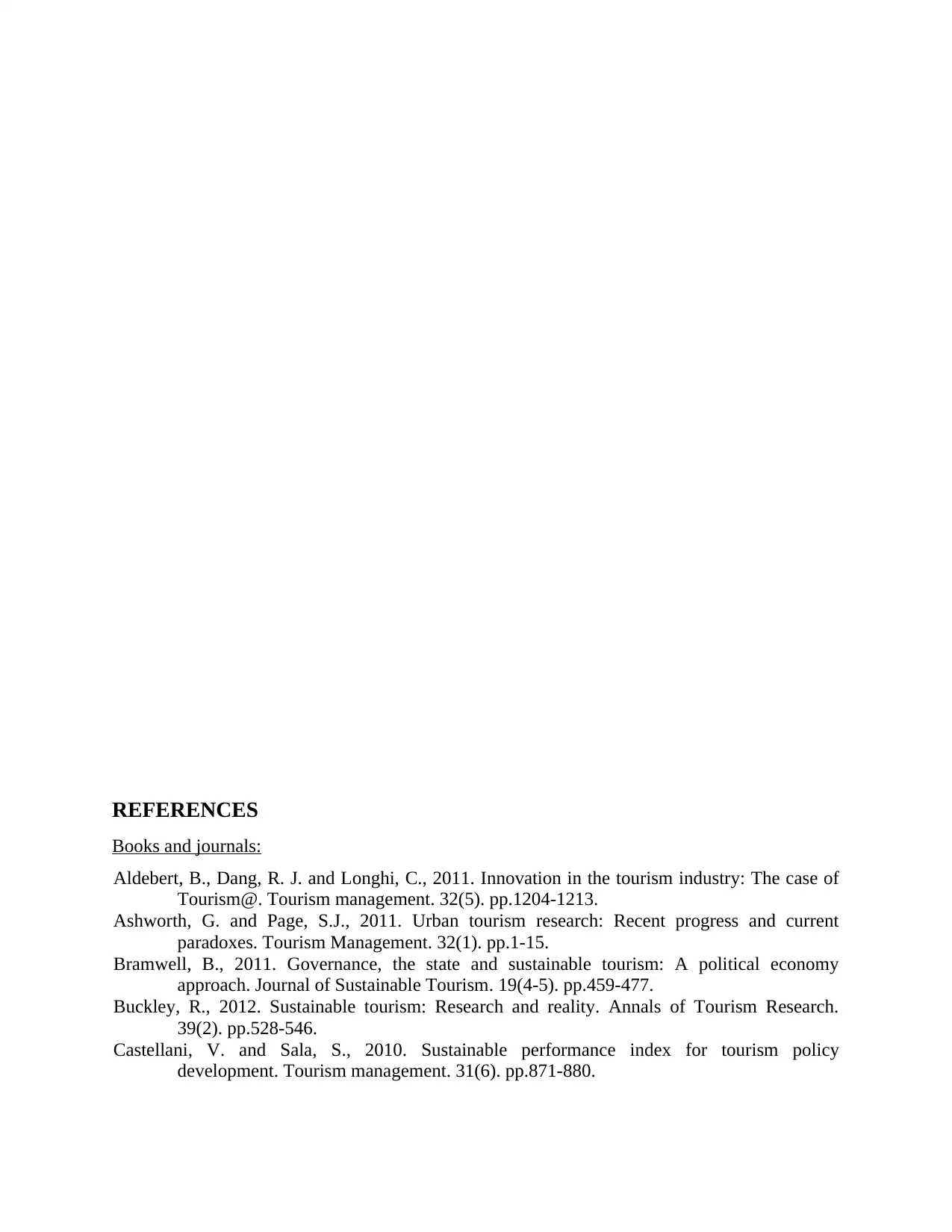
REFERENCES
Books and journals:
Aldebert, B., Dang, R. J. and Longhi, C., 2011. Innovation in the tourism industry: The case of
Tourism@. Tourism management. 32(5). pp.1204-1213.
Ashworth, G. and Page, S.J., 2011. Urban tourism research: Recent progress and current
paradoxes. Tourism Management. 32(1). pp.1-15.
Bramwell, B., 2011. Governance, the state and sustainable tourism: A political economy
approach. Journal of Sustainable Tourism. 19(4-5). pp.459-477.
Buckley, R., 2012. Sustainable tourism: Research and reality. Annals of Tourism Research.
39(2). pp.528-546.
Castellani, V. and Sala, S., 2010. Sustainable performance index for tourism policy
development. Tourism management. 31(6). pp.871-880.
Books and journals:
Aldebert, B., Dang, R. J. and Longhi, C., 2011. Innovation in the tourism industry: The case of
Tourism@. Tourism management. 32(5). pp.1204-1213.
Ashworth, G. and Page, S.J., 2011. Urban tourism research: Recent progress and current
paradoxes. Tourism Management. 32(1). pp.1-15.
Bramwell, B., 2011. Governance, the state and sustainable tourism: A political economy
approach. Journal of Sustainable Tourism. 19(4-5). pp.459-477.
Buckley, R., 2012. Sustainable tourism: Research and reality. Annals of Tourism Research.
39(2). pp.528-546.
Castellani, V. and Sala, S., 2010. Sustainable performance index for tourism policy
development. Tourism management. 31(6). pp.871-880.
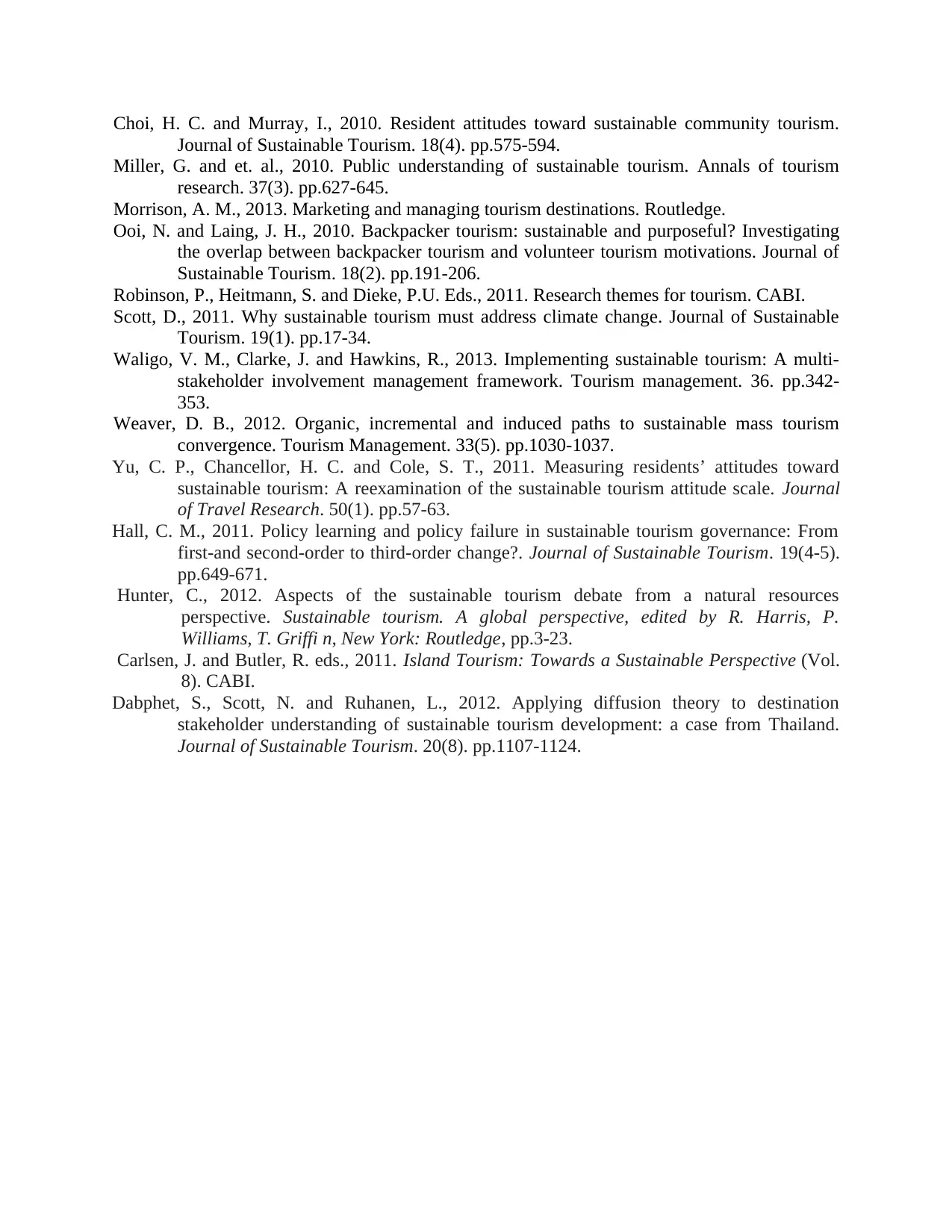
Choi, H. C. and Murray, I., 2010. Resident attitudes toward sustainable community tourism.
Journal of Sustainable Tourism. 18(4). pp.575-594.
Miller, G. and et. al., 2010. Public understanding of sustainable tourism. Annals of tourism
research. 37(3). pp.627-645.
Morrison, A. M., 2013. Marketing and managing tourism destinations. Routledge.
Ooi, N. and Laing, J. H., 2010. Backpacker tourism: sustainable and purposeful? Investigating
the overlap between backpacker tourism and volunteer tourism motivations. Journal of
Sustainable Tourism. 18(2). pp.191-206.
Robinson, P., Heitmann, S. and Dieke, P.U. Eds., 2011. Research themes for tourism. CABI.
Scott, D., 2011. Why sustainable tourism must address climate change. Journal of Sustainable
Tourism. 19(1). pp.17-34.
Waligo, V. M., Clarke, J. and Hawkins, R., 2013. Implementing sustainable tourism: A multi-
stakeholder involvement management framework. Tourism management. 36. pp.342-
353.
Weaver, D. B., 2012. Organic, incremental and induced paths to sustainable mass tourism
convergence. Tourism Management. 33(5). pp.1030-1037.
Yu, C. P., Chancellor, H. C. and Cole, S. T., 2011. Measuring residents’ attitudes toward
sustainable tourism: A reexamination of the sustainable tourism attitude scale. Journal
of Travel Research. 50(1). pp.57-63.
Hall, C. M., 2011. Policy learning and policy failure in sustainable tourism governance: From
first-and second-order to third-order change?. Journal of Sustainable Tourism. 19(4-5).
pp.649-671.
Hunter, C., 2012. Aspects of the sustainable tourism debate from a natural resources
perspective. Sustainable tourism. A global perspective, edited by R. Harris, P.
Williams, T. Griffi n, New York: Routledge, pp.3-23.
Carlsen, J. and Butler, R. eds., 2011. Island Tourism: Towards a Sustainable Perspective (Vol.
8). CABI.
Dabphet, S., Scott, N. and Ruhanen, L., 2012. Applying diffusion theory to destination
stakeholder understanding of sustainable tourism development: a case from Thailand.
Journal of Sustainable Tourism. 20(8). pp.1107-1124.
Journal of Sustainable Tourism. 18(4). pp.575-594.
Miller, G. and et. al., 2010. Public understanding of sustainable tourism. Annals of tourism
research. 37(3). pp.627-645.
Morrison, A. M., 2013. Marketing and managing tourism destinations. Routledge.
Ooi, N. and Laing, J. H., 2010. Backpacker tourism: sustainable and purposeful? Investigating
the overlap between backpacker tourism and volunteer tourism motivations. Journal of
Sustainable Tourism. 18(2). pp.191-206.
Robinson, P., Heitmann, S. and Dieke, P.U. Eds., 2011. Research themes for tourism. CABI.
Scott, D., 2011. Why sustainable tourism must address climate change. Journal of Sustainable
Tourism. 19(1). pp.17-34.
Waligo, V. M., Clarke, J. and Hawkins, R., 2013. Implementing sustainable tourism: A multi-
stakeholder involvement management framework. Tourism management. 36. pp.342-
353.
Weaver, D. B., 2012. Organic, incremental and induced paths to sustainable mass tourism
convergence. Tourism Management. 33(5). pp.1030-1037.
Yu, C. P., Chancellor, H. C. and Cole, S. T., 2011. Measuring residents’ attitudes toward
sustainable tourism: A reexamination of the sustainable tourism attitude scale. Journal
of Travel Research. 50(1). pp.57-63.
Hall, C. M., 2011. Policy learning and policy failure in sustainable tourism governance: From
first-and second-order to third-order change?. Journal of Sustainable Tourism. 19(4-5).
pp.649-671.
Hunter, C., 2012. Aspects of the sustainable tourism debate from a natural resources
perspective. Sustainable tourism. A global perspective, edited by R. Harris, P.
Williams, T. Griffi n, New York: Routledge, pp.3-23.
Carlsen, J. and Butler, R. eds., 2011. Island Tourism: Towards a Sustainable Perspective (Vol.
8). CABI.
Dabphet, S., Scott, N. and Ruhanen, L., 2012. Applying diffusion theory to destination
stakeholder understanding of sustainable tourism development: a case from Thailand.
Journal of Sustainable Tourism. 20(8). pp.1107-1124.
1 out of 19
Your All-in-One AI-Powered Toolkit for Academic Success.
+13062052269
info@desklib.com
Available 24*7 on WhatsApp / Email
![[object Object]](/_next/static/media/star-bottom.7253800d.svg)
Unlock your academic potential
© 2024 | Zucol Services PVT LTD | All rights reserved.





